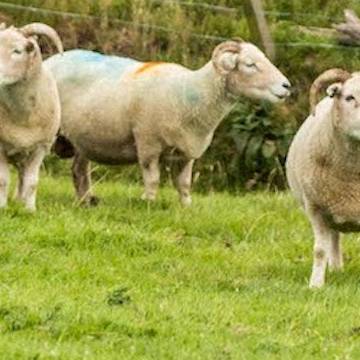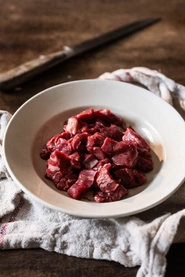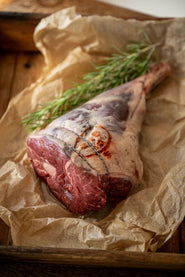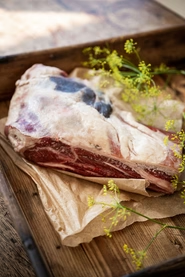Porlock Bay is steeped in history, it’s a land of salt marshes, shingle ridges and even a submerged forest. It is said that in 1052 the Saxon King Harold landed at Porlock Bay and set the town alight, burning it to the ground before marching on to London.
Why am I telling you about this landscape’s forgotten past, you ask? Well, it’s because we are going to talk about forgotten foods. Foods that are as ancient as the story of King Harold and have shaped our landscape through their conception. Porlock also happens to be the home of another story I will share with you...
John and his family have farmed in Porlock for over 5 generations. I always think the stone walls that encase this farm are like family photos up a stairwell. Each generation has at some point heaved the stones and cared for these ancient walls. They are a labour of love and are an indication of the hardworking, dutiful and thoughtful family who live in this place.
There is no doubt about it, John’s farm has one of the finest views in the country. The big sky and big sea stretches out before you as far as the eye can see, surrounding the green hills and grey stone walls with a blanket of blue. There’s an interesting mix of birdlife, sea birds swoop, as do smaller birds you traditionally find dive-bombing pasture. There is wildlife everywhere, sharing this landscape harmoniously with both the livestock reared here and John’s clan.

We have worked with John for almost 30 years, he rears some of the very finest, traditional Red Rubies in the country. John’s cattle have graced our butcher’s block and many of your tables for almost as long as we have run Pipers Farm. However, this year was the first year we have taken Mutton sheep from him. He has badgered me about it for years, singing the virtues of the native Exmoor Horn, and while there is no doubt John rears handsome sheep, we have favoured Peter’s choice of Swaledale mutton, as we took a punt on whether or not our customers would buy into this ‘forgotten food’.

Thankfully you all have taken to mutton like a duck to water. We have been overwhelmed with support for this properly sustainable meat. When I knew that we could expand our brigade of mutton farmers, John was the first name in mind, and it’s with great pleasure that we expand our mutton offering to include another timeless native breed, the Exmoor Horn.
Developed in 19th Century, the Exmoor Horn is a descendant of sheep that had roamed on the moors for several hundred years. Research by the Exmoor National Park has found that numbers have gradually declined: it estimates that in 1947 over 30% of sheep in the Somerset part of Exmoor were purebred Exmoor Horns. As the number of sheep in the region has increased, so the percentage has dropped, and today breeding Exmoor Horn ewes represent only about 10% of the total sheep on Exmoor.

There is a saying that when it comes to native breeds you have to
‘Eat it, to keep it’
The survival of these traditional breeds is directly linked to their popularity. If we favour cheap imports such as New Zealand lamb, or non-native breeds like the Texel, we will continue to see farmers move away from traditional native breeds and not only does the food on our table change, but so does the landscape in which that food has been produced.
Many of us this year have escaped to the country and visited National Parks such as Exmoor. National Parks not only provide vital space for us to be able to exercise and reconnect with nature, but they are also incredibly important in supporting our mental health. In order for these national treasures to continue to be an important place for biodiversity, sequestering carbon and creating a habitat for rare species of flora, forna and insect life, as well as providing recreational space for our physical and mental wellbeing, we must support the farmers who are caring for these landscapes, keeping alive traditional skills and favouring nature first, low input farming.
It fills us with a deep sense of joy, seeing more of you return to forgotten foods such as mutton and valuing not only the food on your plate, but the work of the people who have produced it.






